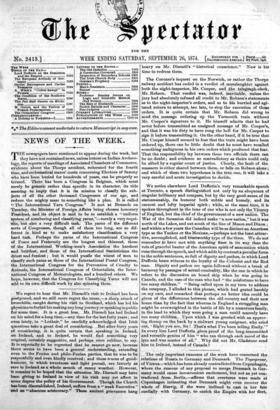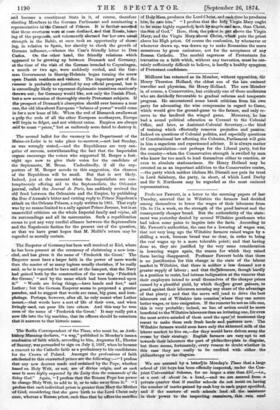The only important rumours of the week have concerned the
relations of Russia to Germany and Denmark. The Tagespresse, of Vienna—which has been already contradicted from Copenhagen, where the rumour of any proposal to merge Denmark in Ger- many would cause inconvenient excitement, but not as yet con- tradicted from Berlin,—affirms that overtures were made at Copenhagen intimating that Denmark might even recover the whole of Slesvig, if she were inclined to cast in her fate cordially with Germany, to enrich the Empire with her fleet, _and become a constituent State in it, of course, therefore electing Members to the German Parliament and nominating a representative in the Council of Princes. lit is further asserted that these overtures were at once declined, and that Russia, hear- ing of the proposals, and vehemently alarmed for her own naval strength in the Baltic, at once took an opportunity of show- ing, in relation to Spain, her alacrity to check the growth of German influence,—whence the Czar's friendly letter to Don Carlos. On they other hand, the friendly relations which appeared to be growing up between Denmark and Germany, at the time of the visit of the German ironclad to Copenhagen, a month or two ago, were suddenly cooled, and the Ger- man Government in Slesvig-Holstein began turning the screw upon Danish residents and visitors. The important part of the ramour is probably not justified by any official proposal, but it in exceedingly likely to represent diplomatic tentatives cautiously thrown out ; for Germany would like, not only the Danish Fleet, but a new accession of thoroughly sturdy Protestant subjects. If the prospect of Denmark's absorption should ever become a near one, the old idea about European "balance of power" would come in for a new lease of life. When the rod of Bismarck swallows at a gulp the rods of all the other European soothsayers, Europe will begin to fidget, and not without cause. Empires are always said to mean "peace," but as uniformly seem fated to destroy it.































